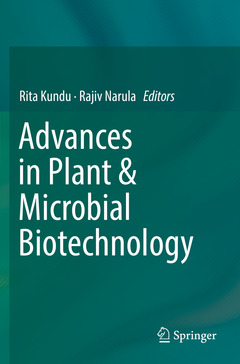Description
Advances in Plant & Microbial Biotechnology, 1st ed. 2019
Coordinators: Kundu Rita, Narula Rajiv
Language: English
Subjects for Advances in Plant & Microbial Biotechnology:
Publication date: 08-2020
Support: Print on demand
Publication date: 04-2019
Support: Print on demand
Description
/li>Contents
/li>Biography
/li>Comment
/li>
Introduction.- Chapter 1: Dilute Acid Pretreatment Efficiency on Various Solid Loadings and Effect of Different Neutralizing Agents on Xylulosic Ethanol Production.- Chapter 2: Effect of BGA Biofertilizers Using Different Carrier Materials on Rice Crop.- Chapter 3: Identification of Differentially Expressed Terminal Heat Stress Associated Proteins in Developing Grains in Wheat (Triticum Aestivum L.).- Chapter 4: The genetic toxicity potential of heavy metals (Zn, Cu) on Vigna radiata, Triticum aestivum and Cicer arietinum.- Chapter 5: Production, Optimization, and Charaterization of Siderophore by Pseudomonas Aeruginosa (C3) Isolated From Rhizospheric Soil.- Chapter 6: Development of Marker in the Soft Gold Mushroom Cordyceps Sp. For Strain Improvement.- Chapter 7: Optimization of Microwave Assisted Pretreatment of Rice Straw with Fecl3 in Combination with H3po4 for Improving Enzymatic Hydrolysis.- Chapter 8: Profiling Indolic Auxins Produced by the Strains of Aspergillus Using Novel HPTLC Technique.- Chapter 9: Comparative Analysis of Cytotoxic Potential of Crude Extracts and Fractionated Isolates from Moringa Oleifera Lam.- Chapter 10: Hydroxy Fatty Acid from Camelina Sativa Seed Oil for Industrial Application.- Chapter 11: Comparison of Different Planting Methods to Determine the Precision of Phenotyping Wheat in Field Experiments.- Chapter 12: Effect of extraction temperature and different carrier agents on the physicochemical and antioxidant properties of spray dried Murraya koenigii (Linn.) leaf extract.- Chapter 13: Isolation and characterization of microbial Asparaginase to mitigate Acrylamide formation in food.- Chapter 14: Small Colony Variant Selection, Biofilm Induction and Interspecies Interactions of Ocular Clinical Pseudomonas aeruginosa.- Chapter 15: Comparative analysis of phytochemicals of healthy and symptomatic Clerodendrum inerme.- Chapter 16: Synthesis of Silver Nanoparticle of Aqueous extract of Allium Fistulosum and Its Efficiency against Bacterial Contaminants from Industrial waste water and its Photocatalytic potential.- Chapter 16: Exploration of biocontrol and growth promoting activity of bacterial strains isolated from the sugarcane crop.
These books may interest you

Insect Biotechnology 158.24 €

The Algae World 263.74 €

The Algae World 263.74 €

